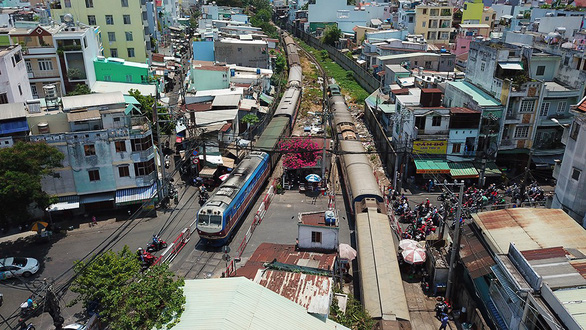The construction of a high-speed railway between Hanoi and Ho Chi Minh City could cost only US$26 billion, compared to the initial estimate of $59 billion, if its operational speed is reduced from 350km/h to 200km/h, according to the Vietnamese Ministry of Planning and Investment.
The idea of building an express railway system running between Vietnam’s two biggest cities as an alternative to the country’s 83-year-old railroad line was included in a prime minister-approved plan to develop the railway sector until 2020, with a vision for 2030.
The north-to-south modern rail will stretch more than 1,545 kilometers, crossing 20 Vietnamese provinces and cities and including 23 stations.
A feasibility report released last August estimated costs of the project’s development to be around $58.71 billion.
By the end of the project’s second phase in 2050, trains would have been able to travel at up to 350km/h, effectively shortening journeys between Hanoi and Ho Chi Minh City to six hours and 50 minutes or five hours and 17 minutes, depending on the number of stops the train makes.
It currently takes at least 31 hours to travel between the two cities on the existing north-to-south railway network, which was launched in 1936, as passenger trains are allowed to travel at the maximum speed of 120km/h on the age-old rail.
The optimal speed
In a report recently submitted to the prime minister, the Ministry of Planning and Investment said 200km/h would be the optimal speed for Vietnam’s north-to-south high-speed rail project due to its efficiency and feasibility.
By reducing the railway system’s operational speed from 350km/h to 200km/h, its cost could be trimmed by nearly $33 billion, from $59 billion to $26 billion, the ministry said, citing analysis from German and Dutch experts.
At such speed, rail journeys between Hanoi and Ho Chi Minh City could take around eight hours, which is still a reasonable travel time, the ministry said.
Building a passenger-only railway capable of sustaining a speed of up to 350km/h would be both costly and wasteful, as demands for rail travel in Vietnam are forecast to meet only 16 percent of the original plan’s capacity by the year 2035.
The initial estimated cost of the high-speed rail is roughly 50 times higher than the average share of Vietnam’s central state budget for the development of transport infrastructure in a fiscal year, said Prof. Dr. La Ngoc Khue, former Deputy Minister of Planning and Investment.
Should the cost be too high, it could lead to higher ticket prices and hurt the competitiveness of the high-speed rail compared to air travel, which is only getting cheaper over the time, the ministry said.
Like us on Facebook or follow us on Twitter to get the latest news about Vietnam!


















































